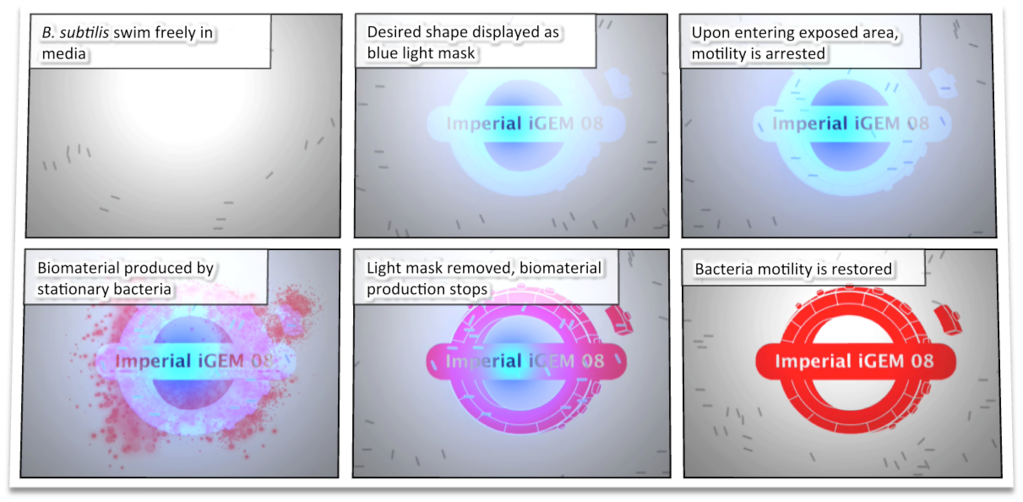Team:Imperial College
From 2008.igem.org
(Difference between revisions)
m |
m |
||
| Line 3: | Line 3: | ||
{{Imperial/Box1|| | {{Imperial/Box1|| | ||
| - | <html><center><img width="830px" src="https://static.igem.org/mediawiki/2008/9/94/Imperial_2008_Title.png"></center> | + | <html><center><img width="830px" src="https://static.igem.org/mediawiki/2008/9/94/Imperial_2008_Title.png"></center><font size="4pt"></html><center>'''<br>For the 2008 iGEM competition, the Imperial College Team aims to develop a genetically-engineered Biofabricator, using the Gram-positive bacterium ''Bacillus subtilis'' as our chassis. Our Biofabricator aims to produce self-assembling biomaterials in specified 3D shapes, using light as the trigger.'''<br><br><html></font> |
| - | <font size="4pt"></html><center>'''<br>For the 2008 iGEM competition, the Imperial College Team aims to develop a genetically-engineered Biofabricator, using the Gram-positive bacterium ''Bacillus subtilis'' as our chassis. Our Biofabricator aims to produce self-assembling biomaterials in specified 3D shapes, using light as the trigger.'''<br><br><html></font> | + | |
<table style="color:#2B48B3;background-color:transparent;"><tr><td><img style="vertical-align:center;" width="380px" src="http://i59.photobucket.com/albums/g305/Timpski/Logo1.png"></td> | <table style="color:#2B48B3;background-color:transparent;"><tr><td><img style="vertical-align:center;" width="380px" src="http://i59.photobucket.com/albums/g305/Timpski/Logo1.png"></td> | ||
<!--<td style="text-align:center;"><br><i><font size="3pt" style="border:2px solid;padding:7px;"><b><a target="_blank" href="https://2008.igem.org/Team:Imperial_College/BioBricks">45 B. subtilis BioBricks submitted!</a></b></font><br><br><font size="3pt" style="border:2px solid;padding:7px;"><b><a target="_blank" href="https://2008.igem.org/Team:Imperial_College/Major_Results">BioBrick Characterisation</a></b></font><br><br><font size="3pt" style="border:2px solid;padding:7px;"><b>Chassis Characterisation</b></font><br><br><font size="3pt" style="border:2px solid;padding:7px;">Cell <b><a target="_blank" href="https://2008.igem.org/Team:Imperial_College/Motility">motility tracking</a></b></font><br><br><font size="3pt" style="border:2px solid;padding:7px;">Extensive <b><a target="_blank" href="https://2008.igem.org/Team:Imperial_College/Dry_Lab">modelling</a></b></font></i>--> | <!--<td style="text-align:center;"><br><i><font size="3pt" style="border:2px solid;padding:7px;"><b><a target="_blank" href="https://2008.igem.org/Team:Imperial_College/BioBricks">45 B. subtilis BioBricks submitted!</a></b></font><br><br><font size="3pt" style="border:2px solid;padding:7px;"><b><a target="_blank" href="https://2008.igem.org/Team:Imperial_College/Major_Results">BioBrick Characterisation</a></b></font><br><br><font size="3pt" style="border:2px solid;padding:7px;"><b>Chassis Characterisation</b></font><br><br><font size="3pt" style="border:2px solid;padding:7px;">Cell <b><a target="_blank" href="https://2008.igem.org/Team:Imperial_College/Motility">motility tracking</a></b></font><br><br><font size="3pt" style="border:2px solid;padding:7px;">Extensive <b><a target="_blank" href="https://2008.igem.org/Team:Imperial_College/Dry_Lab">modelling</a></b></font></i>--> | ||
| - | </td></tr></table | + | </td></tr></table><br><hr><center><font size="4pt" style="border:0px solid;padding:10px;">Pushed for time? <b><a target="_blank" href="https://2008.igem.org/Team:Imperial_College/Summary">Project Summary</a> | <a target="_blank" href="https://2008.igem.org/Team:Imperial_College/Summary#Results">Achievements</a> | Growing Clothes: <b><a target="_blank" href="https://2008.igem.org/Team:Imperial_College/Cellulose">BioCouture</a></b></font></center><hr><br></html> |
| - | + | ||
|}} | |}} | ||
| - | {{Imperial/Box1|'''<html><font size=6px>Overview</font></html>'''|<html><center><object width="425" height="350"> <param name="movie" value="http://www.youtube.com/v/pqEmKkY5DxA"> </param> <embed src="http://www.youtube.com/v/pqEmKkY5DxA" type="application/x-shockwave-flash" width="425" height="350"> </embed> </object></center></html> | + | {{Imperial/Box1|'''<html><font size=6px>Overview</font></html>'''| |
| + | The following video is a simplified representation of how we want our system to work... | ||
| + | <html><center><object width="425" height="350"> <param name="movie" value="http://www.youtube.com/v/pqEmKkY5DxA"> </param> <embed src="http://www.youtube.com/v/pqEmKkY5DxA" type="application/x-shockwave-flash" width="425" height="350"> </embed> </object></center></html> | ||
*First by utilising an endogenous light-sensing mechanism, the bacteria is captured in the desired location using 3D holography. | *First by utilising an endogenous light-sensing mechanism, the bacteria is captured in the desired location using 3D holography. | ||
*Next bacterial locomotion is suspended in the region of interest using a recently-discovered clutch mechanism. This involves disengaging the flagellum from the motor protein. | *Next bacterial locomotion is suspended in the region of interest using a recently-discovered clutch mechanism. This involves disengaging the flagellum from the motor protein. | ||
Revision as of 02:37, 30 October 2008
|
||||||||||||||||
 "
"







